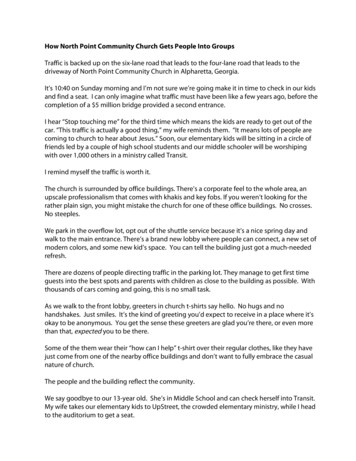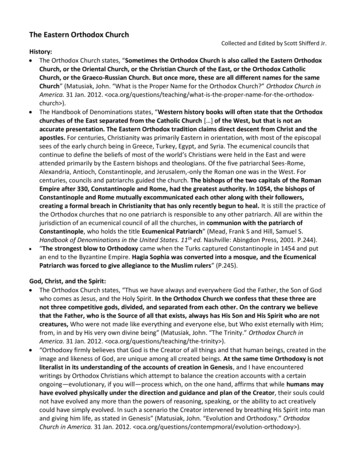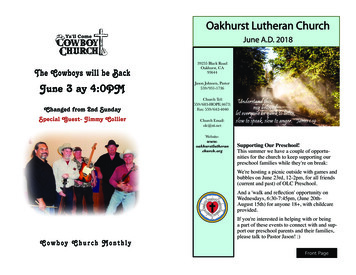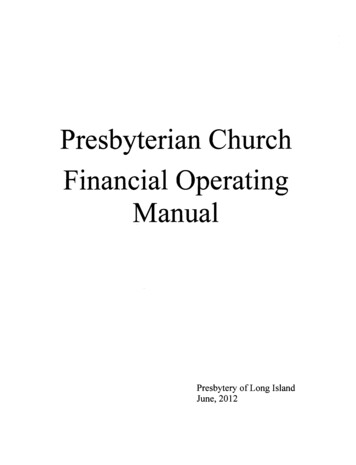
Transcription
How North Point Community Church Gets People Into GroupsTraffic is backed up on the six-lane road that leads to the four-lane road that leads to thedriveway of North Point Community Church in Alpharetta, Georgia.It’s 10:40 on Sunday morning and I’m not sure we’re going make it in time to check in our kidsand find a seat. I can only imagine what traffic must have been like a few years ago, before thecompletion of a 5 million bridge provided a second entrance.I hear “Stop touching me” for the third time which means the kids are ready to get out of thecar. “This traffic is actually a good thing,” my wife reminds them. “It means lots of people arecoming to church to hear about Jesus.” Soon, our elementary kids will be sitting in a circle offriends led by a couple of high school students and our middle schooler will be worshipingwith over 1,000 others in a ministry called Transit.I remind myself the traffic is worth it.The church is surrounded by office buildings. There’s a corporate feel to the whole area, anupscale professionalism that comes with khakis and key fobs. If you weren’t looking for therather plain sign, you might mistake the church for one of these office buildings. No crosses.No steeples.We park in the overflow lot, opt out of the shuttle service because it’s a nice spring day andwalk to the main entrance. There’s a brand new lobby where people can connect, a new set ofmodern colors, and some new kid’s space. You can tell the building just got a much-neededrefresh.There are dozens of people directing traffic in the parking lot. They manage to get first timeguests into the best spots and parents with children as close to the building as possible. Withthousands of cars coming and going, this is no small task.As we walk to the front lobby, greeters in church t-shirts say hello. No hugs and nohandshakes. Just smiles. It’s the kind of greeting you’d expect to receive in a place where it’sokay to be anonymous. You get the sense these greeters are glad you’re there, or even morethan that, expected you to be there.Some of the them wear their “how can I help” t-shirt over their regular clothes, like they havejust come from one of the nearby office buildings and don’t want to fully embrace the casualnature of church.The people and the building reflect the community.We say goodbye to our 13-year old. She’s in Middle School and can check herself into Transit.My wife takes our elementary kids to UpStreet, the crowded elementary ministry, while I headto the auditorium to get a seat.
All of our kids will experience roughly the same thing: singing, large-group story-telling orteaching, and small groups. The overall environment, the creativity, and the content of thehour-long experience is nothing short of amazing. You might think any church with a bigbudget and a lot of staff can pull off quality like this, but that’s not the case. It requires a lot offocus and a lot of hard work, and it doesn’t have as much to do with the budget as you mightthink.Years ago, I heard Andy challenge church leaders with the ideas that their children’senvironments would be equally top-notch if they stopped doing everything else. North Pointdoesn’t have a Christian school, doesn’t do Vacation Bible School and puts no energy towardsWednesday night programs. They funnel all of their children’s ministry resources to Sundaymorning. And it shows.It’s the kind of focus you might expect from one of the most innovative and influentialchurches in America.Throughout the years, North Point has been on the cutting edge of church leadership.The church began in 1995, when Andy Stanley shared the vision at a gathering of Christians inthe North Atlanta Convention Center. Perhaps in their first act of innovation, they met everyother Sunday night for their first three years. In 1998, they moved to their new home, a 2,700seat auditorium on 83 acres on North Point Parkway.By 2001, the church reached full capacity, but instead of building a larger auditorium, theydecided to try something unique. They constructed a second auditorium directly behind thefirst. The stages joined in the rear, allowing pastors and leaders to conduct simultaneousservices. With two linked auditoriums, North Point could now accommodate 5,000 adults atone time.When the East and West Auditoriums were both full, they started another location in a grocerystore. Eventually, Buckhead Church purchased a few acres of prime real estate andconstructed a 3,000-seat worship center. Today, there are six churches in the Atlanta area, alllinked with live video. More than 33,000 attend one of the five Atlanta campuses, making itthe largest church in Atlanta.When people around the country wanted to use this model, they created strategicpartnerships, their own version of church planting. Today, there are more than two dozenstrategic partners across the country. Some run a few hundred in attendance while the largesthas more than 3,000 attending.Leaders around the country have learned from books such as the Seven Practices of EffectiveMinistry and Deep and Wide, conferences like Drive and Re:Group, or from countless magazinearticles and blog posts. Truly, North Point is one of the most innovative churches in the world.
But their biggest innovation doesn’t involve expensive technology or amazing facilities. Youdon’t have to be an amazing communicator like Andy or have the budget of North Point tolead change in one of the most important areas of your church. The thing that makes NorthPoint successful (and you can define that word in many different ways) is something that willwork in your church as well.The point of today’s message is to encourage everyone who isn’t in a community group totake the step. Andy’s sermon will kickstart a process designed to move people from sitting inrows in the auditorium to sitting in circles in someone’s living room.But it’s not just a passionate plea from the pulpit that moves thousands of people into brandnew small groups each year. There’s a system behind it all, and the system makes the sermonthat much more effective. Too many pastors preach great messages on Biblical communityonly to see few people take action. At North Point, the “get in a group” message is important,but it’s just one step in the process.How Groups Work at NorthpointSo how does North Point get so many people into community groups? We see four distinctsteps. But be careful: if you miss the first one, the rest of them won’t matter.Step One: Create an Environment Where Groups Can ThriveIf you want to move people into Biblical community or small groups, you’ve got to create anenvironment where this is possible. Unfortunately, many churches are set up to prevent thisfrom happening. At North Point, groups are not A thing. They are THE thing.You’ll hear passing comments about the power of groups in video stories played just beforebaptism. You’ll hear “by the way” comments in sermons and during the welcome. And you’llhear the leaders talk about their own groups.Community Groups are part of the DNA at Northpoint. It’s likely you’ll hear a story no matterwhat Sunday you attend.This isn’t accidental. Back in 2009, Andy Stanley said this:“At North Point, we have numeric goals in only one area—our community groupstrategy. We’ve set some pretty big goals. My biggest passion in terms of our church isto connect 100,000 people in small groups—not church attendance—because I thinkmore life change happens in a circle than sitting in a row.”“Circles are better than rows,” they say. And they say it often. You might even think it was theofficial slogan of the church. It’s not, but it is a sentence that describes just how importantgroups are, not just to the church, but to every individual and family who attends.
Look deeper, and you won’t see a church built around preaching or production, but on smallgroups.The well-produced video describing Transit Boot Camp, a two-day retreat for rising sixthgraders shows a lot of fun and games. But it also highlights that it’s the kickoff of a three-yearsmall group journey. You see, middle school small groups stay together for three years. Andleaders commit to lead for three years.UpStreet, the name of the elementary program on Sunday morning, begins with large grouptime and creative Bible storytelling. But as quickly as they can, they move students into smallgroups, with leaders who watch children grow through multiple school years.Men’s ministry at North Point is really small groups ministry. It’s the same with Divorce Care,and Career Transition. All of these are really small groups. What would be full-blownministries with creative programming and special events at other churches fit nicely into thesmall groups ministry at North Point.Groups are more than a program, they are a part of the culture. That’s why two times a year,the entire church will make a concerted effort to help people take steps into groups. It’s thecore strategy, and that strategy provides focus. Everyone that works there knows it’s coming.Everyone that attends regularly knows what the pastors and leaders are trying to do.Tacked on groups will likely not work in your church. Adding groups to an already crowdedmenu of ministries and options will not lead to life change.The groups sermons are not effective simply because Andy is a great communicator, butbecause North Point has created a culture where groups can thrive.Step Two: Preach a Sermon with a Clear Call to ActionTwice a year, Andy preaches a sermon on small groups. He describes the benefits, lays out theargument, and clearly asks everyone to take a step.It’s Strategic Service Sunday today so I know what I’m going to hear. But Andy continuallyfinds new ways to encourage people to move toward groups.“If you want to see what our church is like, you have to go to somebody’s house,” he says.That’s a bold claim from someone who preaches to tens of thousands every Sunday. But it’ssaid with conviction and backed up with years of strategy and stories. He continues themessage by unpacking Ecclesiastes 4:9, which says “a chord of three strands is not quicklybroken.”“You need someone who can see what you can’t see,” he says, reminding everyone that this isone of those common sense principles that doesn’t require faith in Jesus to believe. In a room
full of thousands, Andy finds fresh ways to make the message personal, choosing examplesand stories that hit people right where they are.The sermon is informative, interesting and motivating. Andy presents the Biblical case forcommunity and weaves in anecdotes and life-lessons that present life in community as thenew normal.“The best pastoral care you will receive is not from someone who has been to seminary butfrom someone who knows your name,” he says. In a big church like North Point, it’s easy to beanonymous. But in a small group, you’ll connect with people who will miss you when you’renot there. It’s an environment where you can be known. And where you can get to knowothers.“Circles are better than rows,” he says, for the third or fourth time. And by the time themessage comes to a close, you believe it. If you didn’t already.It’s important to understand something. This sermon doesn’t happen in isolation, like it’s atopic selected from a list of important topics and preached on a random day. Strategic ServiceSunday happens twice a year and the entire church focuses on moving people into groups.The message is public, but behind the scenes, there is a lot of private preparation.The sermon isn’t just the topic for the day. It leads somewhere.Step Three: Host an Event where People Can Join a GroupOnce there’s a culture where groups can thrive, and a plan for talking about groups on aconsistent basic, now the important question remains: what’s the best way to START newgroups?At first, the church tried to connect people individually. Here’s how they described it:Like many of the church leaders we speak with, we used to plug people into groupsusing what we called “spreadsheet assimilation.” Group seekers would submit cards ofinterest to us. We would then enter their information into a spreadsheet and act as aliaison between the seekers and the group leaders who were seeking members. Wewould go back and forth between the two, trying to make good matches. Afterinvesting massive amounts of time and energy, our matchmaking efforts were largelyfruitless.The endless back and forth was producing minimal results and a great deal offrustration and exhaustion. Group seekers and leaders often didn’t get back to us in atimely fashion. We would send numerous emails and make multiple phone calls inorder to get responses to simple questions. Sometimes we felt that we cared more thanthey did.
That led them to something new an event called GroupLink. Here’s how they describe it:We have made the process of joining groups simple for people by creating GroupLink,a 90-minute event held twice a year where people meet and connect with others intheir area of town and stage of life with the purpose of forming a Community Group.We believe that GroupLink continues to be the most effective way to connect peopleinto long-term community, because group seekers have the opportunity to choose thegroups that are best for them by meeting leaders and other potential members inperson.In other words, GroupLink is like speed dating. It turns the process of getting into a group intoa relational experience. There are no spreadsheets or interviews, just an environment wherepeople can connect.Here’s how it works. You show up at the church along with other men, women or married couples lookingto find a new group. Everybody feels weird, but everyone is in the same boat.When you check in, you’re categorized by stage of life. Your name tag is labeled withphrases like “Married without Kids,” “Married with Kids,” or “Empty Nester.” People willfind groups on their own, but the nametags make it easy to identify people who are insimilar life stages.When you enter the large room, there are large signs with areas of town. You hang outnear the sign that says where you live near for most of the night.Throughout the night, some funny videos from Tripp and Tyler (you can buy themhere) and a host on the stage guide you through the evening. You’ll hear phrases like,“By now, you should have met some people who live near you.”You mix and mingle with people who live near you and naturally circle up in groups.There’s no way around it there are some awkward conversations but North Pointdoes everything they can to make it feel normal.There are tons of volunteers looking for people who need help. If you’re having troublefinding a group, someone will help.There’s dessert and coffee – always a nice, relaxing touch.As you circle up with your group, you decide when to meet for the first time. The firstmeeting is just a social, so groups choose to have cookouts or meet at restaurants.The new group commits to eight weeks, and the reminder from the host takes thepressure off.As an introvert, I’ll be the first to admit an event like this is uncomfortable. Look around theroom, and you can see looks of fear on people faces, and you wouldn’t be surprised to findpeople checking their phones or moving closer to the wall. But by the end of the evening,somehow and someway, people are connected to groups.
Does it really work? North Point says 85% of people who connect with a new group atGroupLink continue with a long-term experience. That means people stay well beyond the 8week experiment and commit to doing life together.Will GroupLink work for you? That’s a great question and one you should discuss at lengthwith your team. But all of North Point’s Atlanta-area churches, as well as, dozens of partnerchurches around the country use the same strategy to move people from rows into circles.Additionally, hundreds of churches from all denominations and across all traditions haveadopted a similar approach, even taking the name and brand and using it as their own. Justdo a Google Image search for “GroupLink” and you’ll find all sorts of examples of churchesusing this approach.The GroupLink Starter Kit from North Point resources gives you everything you need to put onyour own GroupLink event. And you can learn more about North Point’s small group ministryat the Re:Group Conference.Step Four: Make it Possible for New Groups to Succeed“We believe that for people to grow spiritually, they must be connected relationally. As aresult, our small group ministry isn’t just another program for us. It’s how we effectivelyconnect, develop, and mobilize people to become lifelonglearners and leaders.” – Re:Group WebsiteGroupLink is a big event that results in dozens of newgroups. Some of these groups have leaders. Some arecalled “formative groups” that will meet for eight weeksand choose a leader from among the ranks.But once a new group is formed, North Point doeseverything it can do to help the new group succeed.First, each new group goes through an eight-weekstarter curriculum called Community: Starting Wellin Your Small Group. This video based curriculum isdesigned to make it easy for groups to get to knoweach other. There are eight sessions in all, mostlywith short-teaching on how groups work best andtestimonials from people who have been in groups.The videos set up a discussion, but knowing there’sa simple curriculum takes the pressure off newgroup leaders and puts new group members atease. There’s something natural about sitting in aliving room and watching something on a TV.
After a couple of group sessions, group members begin to share their stories. Each individualtakes about 10-20 minutes to talk about their life experiences, big moments, and faith journey.There’s a guide in the curriculum, but each story is personal. These storytelling meetings helpthe group really get to know each other. In a way, telling and hearing these stories sets thegroup up for success.All new groups go through this process, and it’s a big key to the success of groups. Byunpacking what groups mean and how they work, and giving everyone space to share theirpersonal story in their own way, community is born. For the next 1-2 years, the groupcontinues to meet and is free to choose their own curriculum. But the starter curriculumprovides a solid foundation.The second thing that helps new groups stay successful speaks directly to the culture of smallgroups at North Point. The church will reimburse parents, at a predetermined rate, forchildcare. That means if you’re in an official North Point group, the church will cover theexpense for your babysitter. Simply fill out a form, and the church will send you a check.Here’s how North Point describes this benefit:We realized that childcare for parents might be an obstacle for participation in acommunity group, so we decided to reimburse parents for childcare costs incurred as aresult of participating in a group. We wanted to remove any obstacles to peopleparticipating in group life.We treat childcare reimbursement as a form of benevolence, and we only reimbursethe parents. We do not pay babysitters directly. Since we consider this a form ofbenevolence, we do not send a 1099 form for miscellaneous income to the recipients ofchildcare reimbursements.Our childcare reimbursement initiative costs us over 371k a year. Even though that isa lot of money, it is considerably less than building and maintaining classroom spacefor several thousand adults on Sunday mornings. (Source)This is a considerable expense to the budget, and it illustrates North Point’s commitment tocommunity. It’s easy for a church to say they value small groups and emphasize Biblicalcommunity, but it’s another thing to align the budget to match those values.Remember, for groups to work, they must be a part of your culture. For North Point, they areputting their money where their mouth is. They don’t just say circles are better than rows; theyback it up with the budget.Circles are Better than Rows
North Point has intentionally designed a strategy based on their church wide commitment.From the calendar to the sermon to Grouplink, there’s a focused effort to move people intogroups. The strategy is repeated year after year, and it leads to results.Whether you adopt their model or not, you should learn from their commitment and strategyand design an experience that will gain traction over time.
Men's ministry at North Point is really small groups ministry. It's the same with Divorce Care, and Career Transition. All of these are really small groups. What would be full-blown ministries with creative programming and special events at other churches fit nicely into the small groups ministry at North Point.










